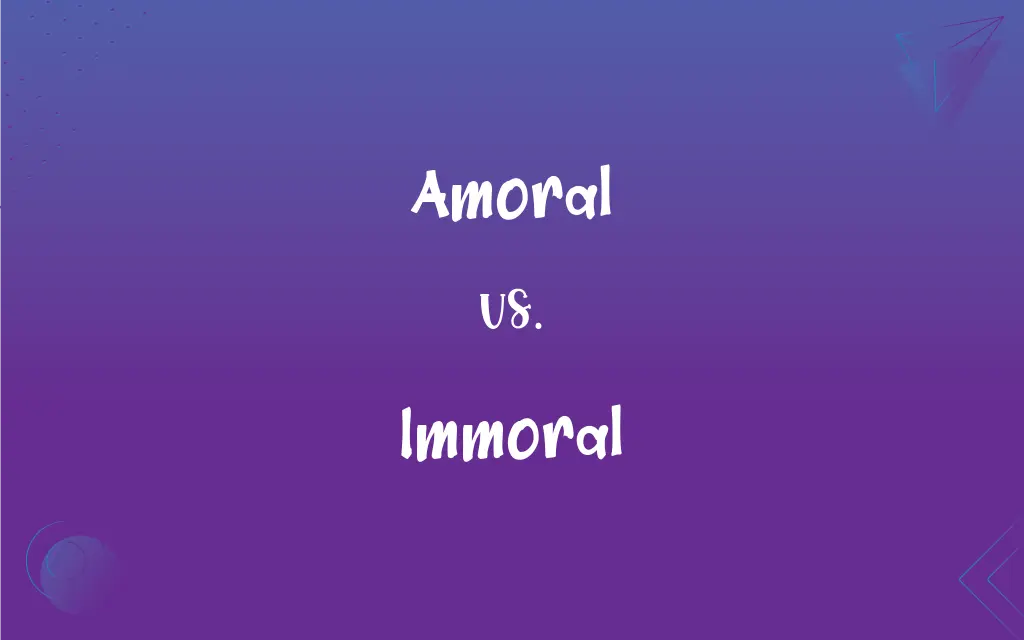Amoral vs. Immoral: What's the Difference?
Edited by Aimie Carlson || By Harlon Moss || Updated on October 23, 2023
Amoral means lacking a moral sense, while immoral refers to actions or behaviors that go against moral norms.

Key Differences
Amoral describes a neutral stance, meaning an absence or lack of moral considerations. Immoral, on the other hand, denotes a clear departure from what is considered morally right or acceptable.
Someone or something described as amoral does not possess or recognize moral distinctions. In contrast, when we label something as immoral, we are actively judging it as wrong based on moral standards.
It's crucial to note that amoral doesn't mean good or bad; it's simply indifferent to those labels. Immoral, however, always carries a negative connotation.
In some contexts, machines or certain decisions can be described as amoral, because they function without inherent moral judgment. Immoral actions or decisions are those that intentionally defy ethical standards.
The core difference between amoral and immoral lies in their relationship to morality: amoral is detached from it, while immoral is in opposition to it.
ADVERTISEMENT
Comparison Chart
Relation to Morality
Lacks moral sense
Goes against moral norms
Connotation
Neutral
Negative
Judgment Involved
No judgment of right or wrong
Judgment of wrongdoing
Typical Usage
Describing indifference to morality
Describing violation of morality
Common Associations
Machines, decisions without ethics
Actions, behaviors seen as wrong
ADVERTISEMENT
Amoral and Immoral Definitions
Amoral
Lacking moral distinctions.
The robot's decisions are amoral; it doesn't recognize good or bad.
Immoral
Ethically wrong or wicked.
Spreading false rumors is an immoral act.
Amoral
Neither moral nor immoral.
Nature, in its essence, is amoral, operating without ethical judgment.
Immoral
Acting without morality.
His immoral actions led to his downfall.
Amoral
Unconcerned with moral principles.
The scientist pursued knowledge in an amoral fashion, disregarding ethical concerns.
Immoral
Violating accepted moral norms.
Bribery is an immoral way to achieve one's goals.
Amoral
Indifferent to moral standards.
His amoral attitude towards business alarmed many.
Immoral
Contrary to moral principles.
Stealing is generally considered immoral.
Amoral
Absence of moral judgment.
The algorithm operates in an amoral manner, processing data without ethics.
Immoral
Not conforming to ethical standards.
The company's immoral practices were exposed by the media.
Amoral
Not admitting of moral distinctions or judgments; neither moral nor immoral.
Immoral
Contrary to established moral principles.
FAQs
Does amoral mean bad?
No, amoral is neutral, indicating indifference to morality, not necessarily bad.
Can a machine be immoral?
Machines typically operate amorally, without moral judgment, rather than immorally.
Are all unethical actions immoral?
Generally, unethical actions are viewed as immoral since they go against accepted moral standards.
What does amoral mean?
Amoral refers to a lack or absence of moral sensibility.
Is it always negative to label something as immoral?
Yes, immoral carries a negative connotation, indicating violation of moral norms.
Can a work of art be immoral?
Some might judge a work of art as promoting immorality, but interpretation is subjective.
Can decisions be amoral?
Yes, decisions made without consideration of ethics can be described as amoral.
What's the opposite of immoral?
The opposite of immoral is moral, meaning in line with accepted moral standards.
Can companies operate amorally?
Companies can make decisions without considering ethics, which would be amoral.
Is lying always immoral?
Lying is generally considered immoral, but interpretations can vary based on cultural or situational contexts.
Is amorality a modern concept?
The concept has been around for a long time, but its application and discussion might be more prevalent in certain modern contexts.
Is it possible for something to be both amoral and immoral?
Typically, they're distinct concepts: amoral means lacking moral sense, while immoral means acting against moral standards.
Is immoral the same as amoral?
No, immoral means acting against moral standards, while amoral means having no moral sense.
Does immoral always relate to ethics?
Immoral typically relates to behaviors or actions against accepted moral or ethical standards.
Is being amoral the same as being neutral?
While both can imply a lack of taking sides, amoral specifically refers to an absence of moral judgment.
Is it better to be amoral or immoral?
Neither is inherently "better," but immoral actions are typically judged negatively, while amoral actions are neutral.
Does amoral mean the same as non-moral?
Both suggest a detachment from morality, but amoral often emphasizes a lack of moral sense, while non-moral is simply outside the realm of morality.
Do all cultures view immorality in the same way?
No, what's considered immoral can vary widely across cultures.
Is nature amoral?
Nature operates without inherent moral judgment, so it can be described as amoral.
Can an individual be inherently amoral?
Individuals typically have moral senses, but their actions or attitudes can sometimes be described as amoral.
About Author
Written by
Harlon MossHarlon is a seasoned quality moderator and accomplished content writer for Difference Wiki. An alumnus of the prestigious University of California, he earned his degree in Computer Science. Leveraging his academic background, Harlon brings a meticulous and informed perspective to his work, ensuring content accuracy and excellence.
Edited by
Aimie CarlsonAimie Carlson, holding a master's degree in English literature, is a fervent English language enthusiast. She lends her writing talents to Difference Wiki, a prominent website that specializes in comparisons, offering readers insightful analyses that both captivate and inform.































































